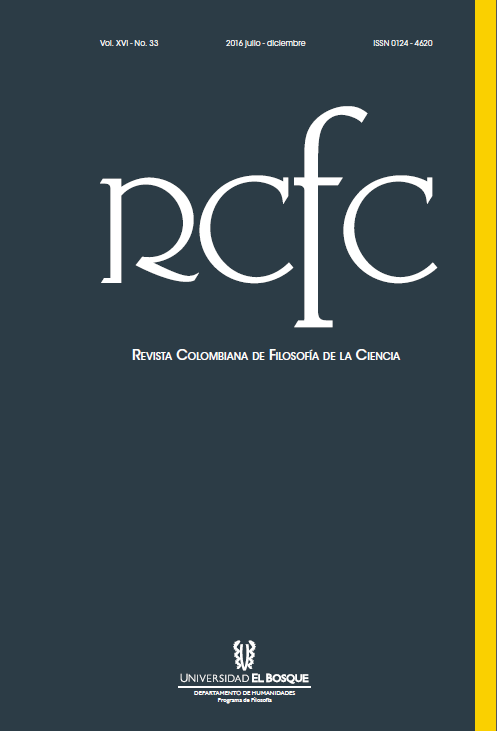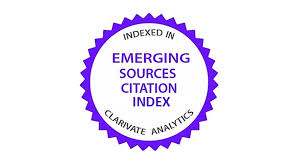Kitcher and Organization of Scientific Research
an Analysis of Science From Ideals of the Economy Models
DOI:
https://doi.org/10.18270/rcfc.v16i33.1935Keywords:
Philosophy of Science, Economic analysis of science, social epistemology, scientific modeling, social ontologyAbstract
This paper shows Kitcher´s work of Science Research Organization. We argue that copyright purpose is valuable. Scientists to pursue their own interests (not necessarily epistemic) can achieve scientific truth (argument born of the economy). The fact of integrating social and individual development of science elements and to achieve knowledge is an advance on traditional epistemology and relativistic epistemology; however this social epistemology development has a limitation in terms of its individualist ontological perspective. This development aproachs allows only see the scientist as an agent theory strategically choose where you want to enroll. The painting of science thus achieved simply illustrates the work of scientists of toys offering a limited position of scientific work. We suggest new analyzes routes in order to approach scientific work as a complement of a social epistemology development with more appropriate social ontology to the purpose of the organization.
Downloads
References
Bhaskar, R. Reclaiming Reality. New York: Routledge. 2011.
Bourdieu, P. Intelectuales, política y poder. Buenos Aires: Eudeba. 1999.
D´Agostino, F. Naturilizing Epistemology: Thomas Kuhn and the Essential Tension. New York: Palgrave Macmillan. 2010.
De-Langhe, R. The Division of Labour in Science: The Tradeoff between Specialisation and Diversity. Journal of Economic Methodology , 37-51. 2010.
De-Langhe, R., & Greiff, M. Standards and the Distribution of Cognitive Labour: A Model of the Dynamics of Scientific Activity. Logic Journal of the IGPL , 18 (2), 278-94. 2009.
Elder-Vass, D. The Causal Power of Social Structures. Cambridge: Cambridge University Press. 2010.
-----. The Reality of Social Construction. Cambridge: Cambridge University Press. 2012.
Fuller, S. Social Epistemology. Indiana: Indiana University Press. 1998.
Giddens, A. La constitución de la sociedad. Buenos Aires: Amorrortu editores. 1984.
Goldman, A. Knowledge in a Social World. Oxford: Oxford University Press. 1999.
Hands, W. Reflection Without Rules: Economic Methodology and Contemporary Science Theory. Cambridge: Cambridge University Press. 2001.
Hull, D. Science as a Process: An Evolutionary Account of the Social and Conceptual Development of Science. Chicago: University of Chicago Press. 1988.
-----. Science in a Democratic Society. New York: Prometheus Books. 2011.
-----. El avance de la ciencia: Ciencia sin leyenda. México: Instituto de Investigaciones Filosóficas. 2001b.
-----. Science, Truth, and Democracy. Oxford: Oxford University Press. 2001a.
Knudseen, C. The Essential Tension in the Social Sciences: Between the “Unification” and “Fragmentation” Trap. In H. S. Jensen, The Evolution of Scientific Knowledge. Edward Elgar. 2002.
Latour, & Woolgar. La vida en el laboratorio: la construcción de los hechos científicos. Madrid: Alianza. 1995.
Latour, B. Nunca fuimos modernos. Buenos Aires: Siglo XXI Editores. 2007.
Lawson, T. Reorienting Economics. New York: Routledge. 2003.
List, C., & Pettit, P. Group Agency: the Possibility, Design, and Status of Corporate Agents. New York: Oxford University Press. 2011.
Longino, H. The Fate of Knowledge: Toward a Hybrid Epistemology. Princeton: Princeton University Press. 2002.
Lumbreras, Á. V. Epistemología social y política del conocimiento: Un análisis del Programa de Investigación de Steve Fuller. Madrid: Universidad Complutense De Madrid, tesis doctoral, Facultad de Filosofía. 2006.
Maki, U. Economic Epistemology: Hopes and Horrors. EPISTEME , 211-221. December. 2004.
Roorda, J. Kitcher on Theory Choice. Erkenntnis, 46, 215-239. 1997.
Searle, J. Making the Social World. Oxford: Oxford University Press. 2010.
Tuomela, R. The Philosophy of Sociality: The Shared Point of View. Oxford: Oxford University Press. 2007.
Tuomela, R., Hakli, R., & Miller, K. Two Kinds of We-Reasoning. Economics and Philosophy (26), 291-320. 2010.
Wray, B. Kuhn´s Evolutionary Social Epistemology. Edimburg: Cambridge University Press. 2011.
Zamora, J. Ciencia Pública, Ciencia Privada. Reflexiones sobre el saber de la producción científica. México: Fondo de Cultura Económica. 2005.
-----. ¿Es la ciencia un mercado de ideas? ArtefaCToS, 1 (1), 71-80. 2008.
-----. “The Economics of Scientific Knowledge”. En U. Mäki, Handbook of the Philosophy of Science. The Philosophy of Economics (pp. 928). North Holland: Elsevier. 2012.
Downloads
Published
How to Cite
Issue
Section
License
Copyright (c) 2016 Revista Colombiana de Filosofía de la Ciencia

This work is licensed under a Creative Commons Attribution-NonCommercial-NoDerivatives 4.0 International License.

| Article metrics | |
|---|---|
| Abstract views | |
| Galley vies | |
| PDF Views | |
| HTML views | |
| Other views | |











